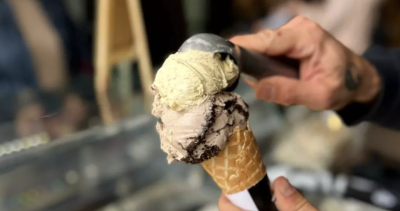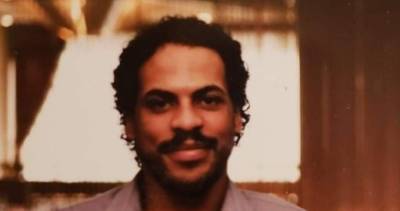PuSh International Performing Arts Festival provides valuable pathways for empathy
Shows address a wide variety of topics, from contemporary Inuit lives to the experiences of a migrant worker to anti-Black racism to an exploration of neurodiversity
Cultural producer, performance creator, and choreographer Gabrielle Martin is feeling good about this year’s PuSh International Performing Arts Festival.
As the new director of programming, the former Cirque du Soleil star has ensured there are plenty of pathways for audiences to gain insights into the experiences of people from a wide range of backgrounds. The festival runs from January 20 to February 6.
“I think one of the amazing things about the performing arts is it can build empathy and it can stimulate our imagination by putting us in the shoes of others,” Martin tells the Straight by phone.
One of many examples is a show called Aalaapi, by Quebec-based Collectif Aalaapi, which integrates theatre and a radio documentary to show how two women from Nunavik (Nancy Saunders and Ulivia Uviluk) are living their lives.
Martin says that her father, who grew up in the Northwest Territories, felt a great sense of comfort from this show, which will be at the Waterfront Theatre, because it rekindled memories of his past.
“It shows the diversity of contemporary Inuit experience,” Martin notes. “And a lot of Canadians aren’t familiar with that.”
A show at the Firehall Arts Centre, Our Fathers, Sons, Lovers and Little Brothers, explores the afterlife of a Black teenager whose life was taken far too soon.
Written and performed by Toronto theatre artist Makambe K Simamba, it was inspired by the fatal shooting of Trayvon Martin in Florida and the subsequent acquittal of his shooter, which kicked off the Black Lives Matter movement. The production goes beyond the headlines to show the experiences and aspirations of a teenage Black male.
“It is a necessary work, and Makambe is an incredible performer,” Martin says. “I think we’re really lucky to see her at work. I think it’s a challenging subject matter that is really handled very masterfully.”
Yet another performance that can help audiences walk in the shoes of others is trans musician-writer–visual artist Vivek Shraya’s theatrical memoir, How to Fail as a Popstar. Playing at Performance Works, it’s a fun show, Martin says, punctuated with a range of musical genres.
“It’s a pretty touching autobiographical work that lays in the margins between pop appeal and failure,” Martin adds. “I think everybody can identify with failure, so there’s a lot of really beautiful comic moments.”
A fourth show that reflects PuSh’s appreciation for empathy-building artistic experiences is I swallowed a moon made of iron, at the Waterfront Theatre. It tells the story of a Chinese factory worker, Xu Lizhi, who had a talent for sharing his sad life in a Foxconn factory in Shenzhen through poetry.
With original and often haunting piano compositions and words that appear in large text, Toronto musician and performer Njo Kong Kie depicts what life was like for Xu in his tiny dormitory-style room.
Martin feels that through music and poetry, Njo is able to make an audience experience the plight of migrant workers in a touching and personal way.
“It’s just such a heart-wrenching work,” Martin says. “It’s truly beautiful and at the same time makes us question economic injustice—but not from such a philosophical place but more from that human place.”
Martin is part of a new collaborative leadership team at the PuSh festival that includes Cree-Saulteaux Métis performing artist Margo Kane as the director of Indigenous initiatives and Jason Dubois as director of operations and development. They’ve established core values for collective decision-making that are guiding the organization forward.
According to Martin, these values include accountability to the festival’s various communities; communication, which Martin characterizes as “radical honesty” as well as an appreciation for listening; empathy; compassion; and generosity to each other and the communities that the festival serves.
“I am really honoured to have this opportunity, and especially in a moment when we are really able to think critically about what we are doing and what the impacts of that are,” Martin says. “I think that is so refreshing because it’s not all the time that you find yourself in an environment when critical thinking is actually genuinely valued.”
Martin points out that the PuSh festival values new forms of staging and new ways of storytelling.
One such example is Violette, which is directed by Catherine Bourgeois, created by Montreal-based Joe Jack et John, and presented by PuSh and Théâtre la Seizième.
In this show at the Roundhouse Community Arts & Recreation Centre, audience members will be invited individually into the character Violette’s bedroom, where they don a virtual-reality headset.
“The technology supports the empathy, which is really important for this work because it takes us into the world of someone who’s neurodiverse,” Martin says.
Se prendre, which features two women in an emotionally affecting, athletically impressive, and erotically suggestive pas de deux, takes place in a historic estate near Burnaby’s Deer Lake. It’s a show by Montreal-based Lion Lion, which was cofounded by Claudel Doucet, and it’s being presented in partnership with the Shadbolt Centre for the Arts.
“It’s informed by acrobatic language. When I first saw it, I just found myself in a really particular state of active witnessing provoked by that proximity with the artists,” Martin says. “It’s really a memorable experience.”
Another show pulsating with physicality is Born to Manifest, by Joseph Toonga and U.K.-based Just Us Dance Theatre. Set to Mikey J’s original score, it’s a “very empowering show for everybody”, according to Martin.
As a Black person, she was particularly taken by how it addresses the violence of racial oppression and the rage that this can generate through krump, popping, and martial arts.
She feels that this is portrayed in a very visceral way while still reflecting the impact of community and relationships that can offer support in the face of this.
“We don’t often see bodies like this in this context,” Martin says. “It’s powerful work. You can feel it. You can’t help it. When I saw it, my heart was racing for a good portion of it.”















Comments